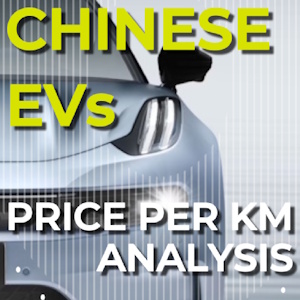Nio’s Battery-as-a-Service (BaaS) is a different way to own an electric vehicle. Instead of buying a car and the battery together, Nio separates the battery from the vehicle purchase. Drivers buy the car at a reduced upfront price and subscribe to the battery, paying a monthly fee for access, maintenance coverage and Nio’s swap-network convenience. The model aims to lower the financial barrier to EV ownership while making long-term battery concerns less stressful for customers. Here’s what you need to know, especially for Europe, how it works, its benefits, costs, and answers to common questions.
Related: Nio EVs Available in Europe
Table of Contents
- How BaaS works
- Why Choose the BaaS Model
- Why Not Choose the Baas Model
- Monthly cost changes in Europe
- Subscription vs. Battery Ownership: Cost Comparison
- The Bottom Line
- FAQ
How BaaS works
Under Nio’s BaaS plan the battery is owned by Nio or a dedicated battery-asset company and the vehicle is sold without that battery included in the purchase price. After buying the car, the driver signs a subscription agreement to rent a battery. The subscription covers the battery itself, and subscribers keep access to Nio’s Power Swap network, where a depleted pack can be exchanged for a charged one in a matter of minutes. The separation of vehicle and battery also enables flexible battery upgrades or temporary swaps between standard and long-range packs in some European markets.
Why Choose the BaaS Model
The most immediate advantage is a lower initial purchase price for the EV, which reduces the upfront cost that often deters buyers. Because the battery remains the property of the provider, concerns about long-term degradation or unexpected battery replacement costs are minimised. Drivers who need occasional extra range can use the swap infrastructure or upgrade their subscription temporarily, while those with shorter daily journeys can stick with a smaller, more economical battery option.
And let’s not forget about speed: instead of waiting by the charger for your battery to top up, you can swap it in just a few minutes at one of Nio’s dedicated Power Swap stations. The combination of lower entry cost, operational simplicity and access to fast swap stations is what makes BaaS attractive.
Why Not Choose the Baas Model
While BaaS reduces initial cost and mitigates battery-related risk, it is not automatically the best option over a long ownership period. If you keep a vehicle for many years and rarely need to change battery capacity, cumulative subscription fees could exceed the cost of buying a battery outright.
In European markets, vehicles purchased with a battery included do not have access to the swap network, and switching from one ownership model to the other can be restricted. Availability of swap stations, local terms and buy-out rules vary by country and can affect the practical value of the subscription.

Another factor to consider is resale. A Nio purchased without a battery is tied to the subscription system, which can make selling the car more complicated. Any future buyer would need to agree to take on the subscription as well, limiting the potential market.
Coverage of battery swap stations is still limited across Europe, meaning the full benefit of the model is not always available outside of key regions like Norway or parts of Germany. Even where stations do exist, customers rely on Nio’s exclusive network. This monopoly-style system raises concerns that subscription fees could increase over time, leaving owners with little choice but to pay.
There’s also the uncertainty of battery condition. While Nio ensures that every swapped pack meets operational standards, customers never truly know how heavily a specific battery has been used before receiving it. For some, this lack of transparency may be unsettling compared to owning and maintaining a dedicated battery pack.
That said, some buyers might find BaaS appealing because it removes battery degradation concerns, lowers the barrier to entry for premium EVs, and offers the unique ability to adapt capacity to changing needs. Ultimately, the decision comes down to whether flexibility and lower upfront costs outweigh the potential long-term drawbacks.
Monthly cost changes in Europe
If you decide to go with Battery-as-a-Service subscription, instead of owning the battery outright you will be paying a recurring monthly fee to Nio. The amount depends on which battery pack you choose and the market in which you live. Across Europe, where Nio currently operates in countries such as Germany, the Netherlands, Norway and Sweden, the pricing has been relatively consistent.

For drivers opting for the 75 kWh standard-range battery, the subscription is set at roughly €169 per month. Those who prefer the larger 100 kWh long-range battery pay closer to €289 per month. This structure gives customers the ability to balance costs against their driving habits: city drivers with shorter commutes may find the standard option sufficient, while frequent travellers may prefer the security of a bigger battery.
Adding further flexibility, Nio has begun offering a service in several European markets that allows subscribers to switch between the two battery sizes on a monthly basis. This means you could drive with the standard-range battery for everyday use and then upgrade to the long-range pack ahead of a holiday or a series of longer trips, without permanently committing to the higher subscription.
Subscription vs. Battery Ownership: Cost Comparison
To give a practical sense of the long-term costs, let’s compare the cumulative subscription fees over one, three and five years for both battery options.
| Battery Option | 75 kWh Battery | 100 kWh Battery |
| Monthly Subscription | €169 | €289 |
| 1-Year Subscription Cost | €2,028 | €3,468 |
| 3-Year Subscription Cost | €6,084 | €10,404 |
| 5-Year Subscription Cost | €10,140 | €17,340 |
| Purchase Cost | €9,000 | €12,000 |
If you subscribe to the 75 kWh standard-range battery at €169/month, the total cost after three years would be €6,084. For the 100 kWh long-range battery at €289/month, the three-year total would reach €10,404.
In comparison, purchasing a standard 75 kWh battery outright in Europe may cost around €9,000, while a 100 kWh battery could be priced closer to €12,000 (prices vary by country). This shows that for drivers who plan to keep their car for several years without frequent battery upgrades, owning the battery outright could be cheaper in the long term. BaaS, however, provides unmatched flexibility, lower upfront costs, and access to battery swap stations, which might be valuable benefits for some users.

The Bottom Line
Nio’s Battery-as-a-Service model transforms the battery from a purchased asset into a managed subscription. For drivers focused on lower upfront cost, flexibility, and reduced exposure to battery degradation, BaaS is an attractive solution. For long-term owners who prioritize total lifetime cost, buying the battery outright may make more sense. Ultimately, the best choice depends on driving habits, how often you need extended range, and access to NIO’s swap infrastructure.
FAQ
What does the subscription cover?
The subscription generally includes the battery itself, battery health management, and access to NIO’s swap network, where available. Maintenance and replacement of degraded packs are handled by the provider.
Can I upgrade or downgrade battery capacity after subscribing?
Yes. In several European markets, NIO allows customers to switch between the standard 75 kWh battery and the 100 kWh long-range battery on a monthly basis where the flexible replacement service has been launched.
Can I buy the battery later if I start with BaaS?
Switching from BaaS to battery ownership is restricted in many European markets. Buyers should check local terms as buy-out options vary by country and may be limited.
Is BaaS always the cheaper long-term option?
Not necessarily. If you keep a vehicle for many years and consistently require long-range capabilities, owning the battery outright may eventually be more economical. BaaS excels at reducing upfront cost, providing flexibility, and giving access to swap stations.



